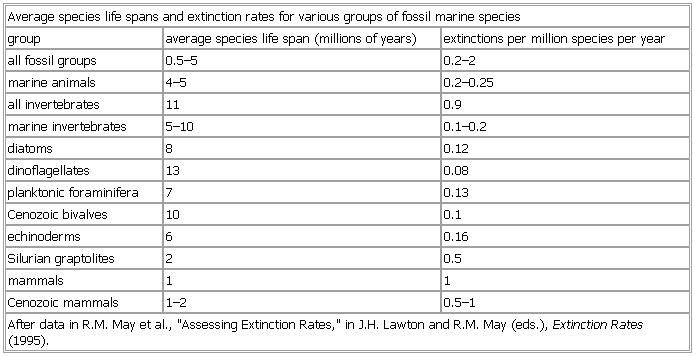Average species life spans and extinction rates for various groups of fossil marine species
- Average species life spans and extinction rates for various groups of fossil marine species
-
Average species life spans and extinction rates for various groups of fossil marine species
group average species life span (millions of years) extinctions per million species per year
all fossil groups 0.5–5 0.2–2
marine animals 4–5 0.2–0.25
all invertebrates 11 0.9
marine invertebrates 5–10 0.1–0.2
diatoms 8 0.12
dinoflagellates 13 0.08
planktonic foraminifera 7 0.13
Cenozoic bivalves 10 0.1
echinoderms 6 0.16
Silurian graptolites 2 0.5
mammals 1 1
Cenozoic mammals 1–2 0.5–1
After data in R.M. May et al., "Assessing Extinction Rates," in J.H. Lawton and R.M. May (eds.), Extinction Rates (1995).
See as table:
* * *
Universalium.
2010.
Look at other dictionaries:
conservation — conservational, adj. /kon seuhr vay sheuhn/, n. 1. the act of conserving; prevention of injury, decay, waste, or loss; preservation: conservation of wildlife; conservation of human rights. 2. official supervision of rivers, forests, and other… … Universalium
Life Sciences — ▪ 2009 Introduction Zoology In 2008 several zoological studies provided new insights into how species life history traits (such as the timing of reproduction or the length of life of adult individuals) are derived in part as responses to… … Universalium
India — /in dee euh/, n. 1. Hindi, Bharat. a republic in S Asia: a union comprising 25 states and 7 union territories; formerly a British colony; gained independence Aug. 15, 1947; became a republic within the Commonwealth of Nations Jan. 26, 1950.… … Universalium
cañada — /keuhn yah deuh, yad euh/, n. Chiefly Western U.S. 1. a dry riverbed. 2. a small, deep canyon. [1840 50; < Sp, equiv. to cañ(a) CANE + ada n. suffix] * * * Canada Introduction Canada Background: A land of vast distances and rich natural resources … Universalium
Canada — /kan euh deuh/, n. a nation in N North America: a member of the Commonwealth of Nations. 29,123,194; 3,690,410 sq. mi. (9,558,160 sq. km). Cap.: Ottawa. * * * Canada Introduction Canada Background: A land of vast distances and rich natural… … Universalium
Cold seep — Marine habitats Tube worms are among the dominant species in one of four cold seep community types in the Gulf of Mexico. Littoral zone … Wikipedia
United States — a republic in the N Western Hemisphere comprising 48 conterminous states, the District of Columbia, and Alaska in North America, and Hawaii in the N Pacific. 267,954,767; conterminous United States, 3,022,387 sq. mi. (7,827,982 sq. km); with… … Universalium
evolution — evolutional, adj. evolutionally, adv. /ev euh looh sheuhn/ or, esp. Brit., /ee veuh /, n. 1. any process of formation or growth; development: the evolution of a language; the evolution of the airplane. 2. a product of such development; something… … Universalium
Earth Sciences — ▪ 2009 Introduction Geology and Geochemistry The theme of the 33rd International Geological Congress, which was held in Norway in August 2008, was “Earth System Science: Foundation for Sustainable Development.” It was attended by nearly… … Universalium
Asia — /ay zheuh, ay sheuh/, n. a continent bounded by Europe and the Arctic, Pacific, and Indian oceans. 2,896,700,000; ab. 16,000,000 sq. mi. (41,440,000 sq. km). * * * I Largest continent on Earth. It is bounded by the Arctic Ocean, the Pacific Ocean … Universalium

